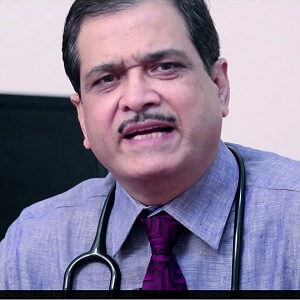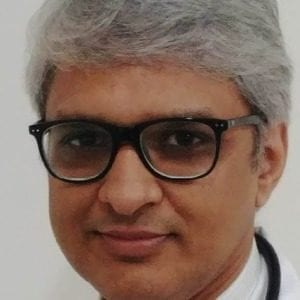Best Doctors in India for Holter Monitoring
- Top Interventional Cardiologist | Apollo Hospital, New Delhi, India
- 26+ Years Experience
- Indraprastha Apollo Hospital, New Delhi
Profile Highlights:
- Dr. Rajeev Kumar Rajput is one of the best Cardiologists in India with nearly 23 years of experience. He is a clinical cardiologist engaged in diagnosing and treating cardiovascular diseases.
- Dr. Rajput is currently working as a senior consultant with Indraprastha Apollo Hospitals, New Delhi, and also offers patient care at the Heart & Gynae Clinic.
- Dr. Rajeev Kumar Rajput specializes in Angiography and Interventional Cardiology. The treatments provided involve Neonatal and Infant cardiac surgeries, Device Closure, and Valve replacement. He has expertise in Aortic Aneurysm Surgery, Vascular Surgery, Percutaneous Coronary Interventions, Endovascular Repair, Cardiac Catheterisation, Open Heart Surgery, and MV replacement.
- Dr. Rajput is credited with publishing several papers in noted medical journals.
- Cardiologist, Gurugram, India
- Over 20 years’ experience
Profile Highlights:
- Dr. Vivek Chaturvedi is a highly experienced and acclaimed cardiologist with over 20 years of experience.
- He has performed more than 2500 cardiac ablations, several of them for complex arrhythmias like atrial tachycardia, ventricular tachycardia, VPC, and atrial fibrillation using the latest technology like 3D Electroanatomic mapping.
- He has more than 50 publications in international journals & books.
- Interventional Cardiologist, Chennai, India
- Over 15 years’ experience
- Apollo Hospitals Greams Road
Profile Highlights:
- Dr. Sai Satish is a distinguished Senior Interventional Cardiologist affiliated with Apollo Hospitals in India, renowned for his pioneering contributions to the field of transcatheter valve therapies.
- His expertise extends internationally, as he also serves as a practicing interventional cardiologist and esteemed faculty member at the Gottsegen Institute of Cardiology in Budapest, Hungary, one of the world’s leading centers for TAVR (transcatheter aortic valve replacement) training.
- A trailblazer in the realm of minimally invasive cardiovascular procedures, Dr. Satish is celebrated for performing the highest number of percutaneous edge-to-edge mitral repairs (MitraClip implants) in the Indian subcontinent.
Best Hospitals in India for Holter Monitoring
- City: New Delhi, India
Hospital Highlights:
- Over the last 33 years, the Fortis Escorts Heart Institute has set new standards in cardiac treatment with groundbreaking research. It is now known around the world as a centre of expertise for Cardiac Bypass Surgery, Interventional Cardiology, Non-invasive Cardiology, Paediatric Cardiology, and Paediatric Cardiac Surgery.
- The hospital has cutting-edge laboratories that perform a wide range of diagnostic tests in Nuclear Medicine, Radiology, Biochemistry, Haematology, Transfusion Medicine, and Microbiology.
- Fortis Escorts Heart Institute boasts a diverse group of bright and experienced doctors who are backed up by a team of highly qualified, experienced, and devoted support professionals as well as cutting-edge equipment such as the recently installed Dual CT Scan.
- Approximately 200 cardiac doctors and 1600 personnel currently collaborate to manage over 14,500 admissions and 7,200 emergency situations each year. The hospital now has a 310-bed infrastructure, as well as five cath labs and a slew of other world-class amenities.
- City: Faridabad
Hospital Highlights:
In the sprawling city of Faridabad, where healthcare needs are diverse and ever-evolving, one institution has consistently stood out as a beacon of excellence in the field of medicine—Marengo Asia Hospital. Established with a vision to provide world-class healthcare services to the community it serves, Marengo Asia Hospital has emerged as a trusted name synonymous with quality, compassion, and innovation in healthcare.
- City: New Delhi, India
Hospital Highlights:
- Equipped with 650 beds, BLK-Max Super Speciality Hospital is the largest stand-alone private sector hospital in Delhi.
- With over 1500 healthcare providers and 150 globally renowned super specialists, the hospital is one of Asia’s largest BMT Centres. The hospital is known for having some of the best cancer doctors in the country.
- The hospital is NABH and NABL accredited and was inaugurated by the first Prime Minister of India. Pt. Jawahar Lal Nehru.
- City: Chennai, India
Hospital Highlights:
- Located in Chennai, India, MGM Healthcare is a top multispecialty hospital that provides all medical services under one roof.
- Since its founding in 2019, MGM Healthcare has quickly become a leading national referral centre, creating several innovative flagship initiatives.
- MGM Healthcare combines next-generation medical and digital technologies to provide better patient results.
- With 12 centres of excellence, more than 400 inpatient beds, 100 intensive care unit beds, and 24/7 emergency care, MGM Healthcare leaves no chance in redefining the patient experience in Chennai.
- MGM Healthcare boasts 250+ expert doctors across 30+ departments, including Cardiology, Pulmonology, Neurology, Obstetrics & Gynaecology, and more.
- They house 12 specialized Centres of Excellence, including Neurosciences, Orthopaedics, and Multi-Organ Transplantation.
- Their team of doctors, nurses, and paramedics works together to give every patient individualized treatment.
- City: Noida, India
Hospital Highlights:
- Fortis Hospital, Noida, stands as one of the oldest and most trusted healthcare institutions in the region, setting a benchmark for comprehensive medical care.
- As the second mega hub hospital in the Fortis Healthcare Group, Fortis Hospital, Noida, upholds a legacy of trust among more than 1.2 million patients. By integrating top-tier professionals with cutting-edge technology, the hospital delivers superior treatment across various medical disciplines.
- Specializing in advanced Neurosciences, Orthopedics, Kidney and Liver Transplant Programmes, Fortis Hospital, Noida has successfully performed over 1,500 transplants, solidifying its reputation as a leader in specialized medical interventions.
Holter Monitoring
Holter Monitoring involves measurement of the heart’s activities like rhythm and heart rate with the help of a small, battery-powered device called Holter Monitor. Your doctor may recommend using Holter Monitor to determine the functioning of your heart. Holter Monitoring is a 24-hour test that records your heart’s rhythm and rate for 24 hours continuously. For that, you may need to wear the Holter Monitor for around 48 hours while performing your routine activities. The medical device has electrical leads & electrodes and can pick up your chest pain or symptoms of arrhythmia & irregular heartbeats. Sometimes, it is referred to as ambulatory electrocardiography.
Your doctor will use the information captured on the Holter Monitor to determine if you have arrhythmia (problems with the heart rhythm). Your doctor may recommend a wireless Holter Monitor, that works for weeks if standard Holter Monitor fails to capture irregular heartbeats.
Reasons for Holter Monitoring
Your doctor may recommend an electrocardiogram if you are suffering from symptoms of heart problems. It is a non-invasive test that utilizes electrodes for checking the rhythm of your heart. However, the test may not detect the irregular heartbeats because you are taped with the electrodes of the machine for a short time. If an irregular heart rhythm is causing the condition and you experience the signs & symptoms, your doctor will ask you to wear a Holter Monitor.
The Holter Monitor that you wear will detect the irregularities with your heart rhythm that the electrocardiogram isn’t able to detect within that period. If your heart condition is responsible for increasing the risk of irregular heart rhythm, then Holter Monitor will be suitable for you. Even if you don’t experience the symptoms of abnormal heart rhythm, your doctor may ask you to wear the Holter Monitor. Your doctor might recommend Holter Monitor if you:
- Are tired or experience shortness of breath
- Have a pacemaker and experience dizziness
- Have fast and pounding heartbeat
- Have chest pain without performing any exercise
- Have fluttering heartbeat
- Need to determine the working of your pacemaker
- Have an irregular, too fast, or too slow heartbeat
- Feel dizzy or faint
- Suffered a heart attack and your doctor needs to determine the risks for heart problems for you.
What conditions does Holter Monitor diagnose?
A Holter Monitor can diagnose various heart conditions like:
- Ventricular tachycardia (fast heartbeat starting in the lower chambers of the heart)
- Atrial fibrillation (rapid heartbeat causing stroke)
- Cardiac arrhythmia (irregular heartbeat) and conduction disorders with a slow heartbeat.
Working of Holter Monitor
The Holter Monitor is quite smaller in size to which several wires or leads attach. The leads connect with the electrodes by a glue-like gel. The metal electrodes placed on your chest are responsible for the conduction of the activities of your heart. They conduct the activity through the wires into the monitor where it is recorded. The small pouch that holds the monitor remains around your neck. During the testing period, the monitor should be close to your body for accuracy in the readings.
During the testing period, if the electrodes fall off or become loose, your doctor will tell you how to reattach them. He or she will instruct you how you must take care of the monitor when you wear it and what things you should not do. You must not take a bath, shower or swim while you wear the Holster Monitor. However, you must perform your daily activities during the test. You must record your activities in a book that will help your doctor to determine if the changes in heart activity are because of your movements and behaviors.
Although there are no risks of wearing Holter Monitor, you may experience mild skin irritation because of the adhesives or tapes that attach your skin to the electrodes. If you are allergic to tapes or adhesives, you must inform the technician who attaches your monitor beforehand. The 24-hour test is painless and records any chest pain, cardiac symptoms or rapid heartbeat during the test period.
Once the Holter Monitor is in place, your doctor will tell you how to:
- Change the batteries of the Holter Monitor
- Push the button present on the monitor when you could feel any of the heart symptoms
- Maintain a diary for all the symptoms that include chest pain, dizziness, changes in the heartbeat, when do the symptoms take place and the activity you were performing while you experienced the symptoms.
Outcomes
Your doctor will talk to you about the results of the Holter Monitor recorder after having a look at it and your activity book/diary in which you noted. Your doctor may recommend some more tests for finding out the symptoms of your problems or the information record from the Holter Monitor itself may be enough to determine if you have a heart condition. Sometimes, the doctor is not able to diagnose the condition on the basis of the results from the Holter Monitor testing. This may be common if you didn’t experience irregular heart rhythm while you were wearing the monitor for two days.
In such situations, your doctor may ask you to use an event recorder or a wireless Holter Monitor or both, instead of the standard one as you can wear them for longer. Event recorders are of different types and similar to the Holter Monitor. You may just need to push a button as you experience any signs or symptoms.
Risks
There aren’t any risks associated with wearing a Holter Monitor but you may experience skin irritation or discomfort in the areas where the technician taped the electrodes. If you are using a wireless Holter Monitor, your technician will instruct you regarding disconnecting and reconnecting the sensors & the Holter Monitor to allow you to bathe or swim. You must avoid magnets, electric blankets, electric toothbrushes, metal detectors, microwave ovens and electric razors while wearing the Holter Monitor as these devices may hinder the path of the signals arising from the electrodes and reaching the monitor. Ensure that you keep your portable music players or cellphones at a distance from the monitor because even they may interrupt the signals arising from the electrodes.








